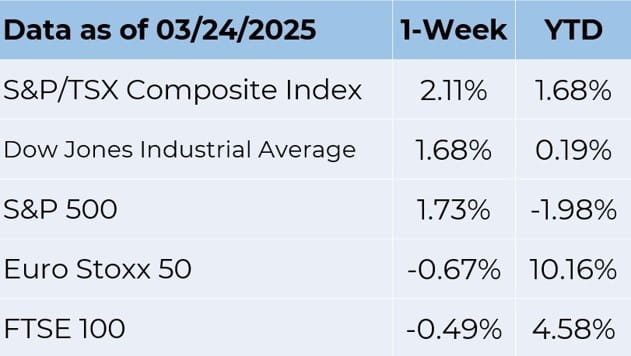Weekly Market Commentary March 27 2025
Canada Snap Election
Mark Carney insists he is the right person to lead Canada to a new economic dawn even as the country faces its biggest test because of President Donald Trump's “unjustified” trade actions. The new prime minister has called for a snap election to capitalize on a remarkable recovery from his Liberal Party in the polls since January.
A former two-time central banker, Carney, with no previous political experience, believes he is the right one to steer the fragile economy under immense pressure amid trade tariffs from the US. He has already proposed cutting the lower income tax bracket by one percent point as one of the ways of shoring the economy and his support ahead of the elections in October.
In addition to thwarting the threat posed by Trump’s tariffs, Carney also faces an uphill task: to show that he is the right candidate to address problems that have bedeviled the country for years. Top on the list is the reliance on the US as an export market. Additionally, he will have to come up with policies that address internal trade barriers between provinces, stagnant productivity and a weak business environment.
Regardless of who wins the upcoming election, it is clear that we are in the final days of economic strategies under Justin Trudeau. The focus is slowly shifting away from government expansion, higher taxes on upper- income earners and rapid population growth. The focus now is on ways to reduce reliance on the US and counter the impacts of the trade tariffs in play.
Canada is now more focused on lowering trade barriers among its 13 provinces and territories because of Trump's trade tariffs. Carney stated that removing these obstacles by July 1 will boost Canada's economy by C$250 billion after meeting with premiers on Friday.
Almost 70% of Canada's total imports and exports come from trade with the United States. Trump has always insisted that the US trade deficit with Canada is a subsidy. However, the unquenchable American desire for Canadian gas and oil is a major motivator fueling the deficit.
To deliver vital minerals and liquefied natural gas projects to new markets, Carney has promised to expedite them and construct the necessary infrastructure. He also intends to continue the contentious policy that caps emissions from the oil sands and the carbon price, claiming that it is required to trade with Europe.
Meanwhile, Canadian stocks started the week on a firm footing, boosted by substantial gains in the technology sector. The country’s main stock index, the Toronto Stock Exchange, was up 300 points on Monday as media reports indicated the US is considering a more moderate approach to proposed tariffs that won’t be as severe as initially feared.
Canadian stocks continued to rise, having emerged that President Donald Trump may hold back on implementing a wide-ranging tariff plan that could hit Canadian businesses hard. Growing optimism that a more targeted approach would prevent the world from an all-out trade continues to bolster market sentiments.
The Markets
The market whisperer…
Last week, the Federal Reserve (Fed) left the federal funds rate unchanged, and Fed Chair Jerome Powell soothed markets. He explained that conditions in the labor market were broadly in balance and inflation had eased significantly over the past two years. Overall, the possibility of recession, while rising, remained low.
Markets rallied following his comments.
The economic outlook for 2025
The Fed’s current median forecast for economic growth in 2025 is 1.7 percent, a bit lower than it was in December. In addition, the Fed’s current median estimate for inflation is 2.7 percent, a bit higher than in December.1 While he was reassuring, Powell explained there is a lot of uncertainty about the economic outlook in the United States. He stated:
“Looking ahead, the new administration is in the process of implementing significant policy changes in four distinct areas: trade, immigration, fiscal policy and regulation. It is the net effect of these policy changes that will matter for the economy and for the path of all monetary policy. While there have been recent developments in some of these areas, especially trade policy, uncertainty around the changes and their effects on the economic outlook is high. As we parse the incoming information, we are focused on separating the signal from the noise as the outlook evolves.”
Consumer spending and the wealth effect
Powell also said that it remains to be seen how consumer and business spending and investment will respond to heightened uncertainty about the economic outlook. It’s an important point because of the “wealth effect”.
The wealth effect is a theory in behavioral economics. It holds that people spend more when the stock market is rising, and the value of their assets is growing. Conversely, people spend less when the stock market is falling, and the value of their assets is declining. It’s difficult to quantify the effect as Mike Bird of The Economist explained:
“Estimates of the ‘wealth effect’ – the amount that rising or falling stocks can support or hurt consumer activity – vary wildly. One academic study in 2019 suggested that a dollar increase in stock market wealth boosted American spending by about three cents. [A large financial-services firm] suggests that the pass-through has risen significantly in recent years, coming up with an extraordinary figure of 24 cents. Whatever the true number, a declining stock market matters for the broader economy.”
Last week, major U.S. stock indices finished higher,while yields on most maturities of U.S. Treasuries moved lower.

Source: FactSet
If You Lose Your Wallet, Do You Expect It To Be Returned?
Here’s some good news from the 2025 World Happiness Report: “People are too pessimistic about the kindness of their communities.”
As usual, the 2025 World Happiness Report offered insights to the countries where citizens are happiest. Once again, Nordic nations dominated.
Canada landed in 15th place while The United States landed in 24th. The countries where the happiest people live are:
- Finland,
- Denmark,
- Iceland,
- Sweden, and
- Netherlands.
Where are people most benevolent?
The 2025 report also tracked a trend that surprised researchers during the Covid-19 years. In 2020, there was an upsurge in benevolent acts – people doing kind things for one another. Researchers theorized that helping others may have “…offset the negative effects felt by many of those whose lives were changed, endangered, and sometimes harmed during the pandemic.”
For the 2025 report, researchers asked how often people performed acts of kindness, specifically donating, volunteering, and helping strangers. The most benevolent countries varied, depending on the type of kindness.
- For donations, Indonesia, Myanmar, and Ukraine ranked first, second, and third.
- For volunteering, Indonesia, Liberia, and Kenya took top honors.
- For helping strangers, Jamaica, Liberia, and Trinidad & Tobago were the leaders.
The United States was 12th for donations, 15th for volunteering, and 12th for helping a stranger.
What about lost wallets?
The study also asked participants how likely it was that a lost wallet would be returned. They compared the data to studies where researchers “lose” wallets to see how often they are returned. Overall, expectations that wallets would be returned were far lower than actual returns.
For example, the actual return rate for lost wallets was 1.8 times higher – almost double – the average estimated return rate. In addition, wallets were more likely to be returned if they contained money.
By the way, the best place to lose your wallet is in a Nordic nation. These countries had both the highest expected and the highest actual rate of return for lost wallets.
Weekly Focus – Think About It
“No act of kindness, no matter how small, is ever wasted.”
–Aesop, Storyteller
Best regards,
Eric Muir
B.Comm (Hons. Finance), CIM®, FCSI
Senior Portfolio Manager
Derek Lacroix
BBA, CIM®, CFP®
Associate Portfolio Manager

P.S. Please feel free to forward this commentary to family, friends or colleagues. If you would like us to add them to the list, please reply to this email with their email address and we will ask for their permission to be added.
Disclaimer:
Information in this article is from sources believed to be reliable, however, we cannot represent that it is accurate or complete. It is provided as a general source of information and should not be considered personal investment advice or solicitation to buy or sell securities. The views are those of the author, Eric Muir and Derek Lacroix and not necessarily those of Raymond James Ltd. Investors considering any investment should consult with their Investment Advisor to ensure that it is suitable for the investor’s circumstances and risk tolerance before making any investment decision. Raymond James Ltd. is a Member Canadian Investor Protection Fund.

